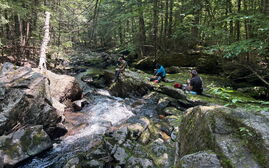Testing alternative for Maine visitors 'as bad as the quarantine,' tourism industry says
More Information
Residents of New Hampshire and Vermont can visit Maine without any restrictions, starting immediately, while those from other states can as of July 1, as long as they can prove they test negative for COVID-19, under the state's new Keep Maine Healthy plan.
But the plan doesn't sit well with the state's tourism industry.
“Our members believe that the testing scheme in the KeepMEHealthy plan will deter visitors from coming to Maine as much as the quarantine," Steve Hewins, CEO of HospitalityMaine, told Mainebiz. The organization represents more than 1,000 members in the state's lodging and restaurant industry.
The plan, an alternative to the state's unpopular 14-day in-state quarantine, is accompanied by an extension of the state's partnership with Westbrook-based IDEXX Laboratories that will allow more statewide testing, including visitors who want to travel around the state. The plan also includes a partnership with the state's community college system, enlisting health care students to help with symptom checks at high-traffic areas.
The move to ease the quarantine, which has been criticized by the state's tourism and retail industries since it went into effect in early April, was met with more criticism from the tourism industry, which said the plan is unworkable and won't allow the state's summer tourism season to recover.
The three cornerstones to the plan are:
- Visitors from states other than New Hampshire and Vermont certify that they have received a recent negative COVID-19 test to stay in lodging establishments;
- Symptom checks are increased at places where visitors tend to go; and
- Community promotion of COVID-19 prevention best practices and public health education is increased.
Mills said during Monday's Maine CDC briefing the testing or quarantine is necessary to keep the virus from spreading as people from out of state pour into Maine. Mills and Nirav Shah, director of Maine CDC, said Monday the additional testing capacity in Maine is what makes the testing requirement possible.
“The COVID-19 pandemic has loomed large over our state’s tourism industry," Mills said during Monday's daily Maine CDC briefing. "Many Maine people are fearful that more visitors will increase the spread of the virus while many small businesses are fearful that a lack of visitors will force them to permanently close their doors.
"It is my hope that by creating layers of protection to reduce the risk of transmission of the virus this plan will protect public health, establish Maine as a safe place to visit, and allow tourists to come to Maine to support our small businesses.
"We’re trying to save the lives and livelihoods of Maine people,” Mills said. State officials stressed Monday that quarantine is a proven public health strategy that mitigates the spread of a virus. It has been implemented in some form in more than half of the states.
Push-back from the tourism industry
With Maine's dependence on out-of-state visitors, critics said the new policy will worsen the industry's already precarious summer season.
“Maine's hospitality industry is on the verge of an economic collapse," Hewins said, adding, "All that restaurants and hotels are looking for now is enough revenue for their business to survive until 2021. Every day digs an even deeper hole.”
HospitalityMaine said that the testing aspect of the plan will deter visitors from coming to Maine as much as the quarantine.
“We believe that its impractical to think visitors will go to a testing site and pay up to $150 per person for a result; they will simply choose another place to visit," he said. "We are not confident that the testing capacity exists or that requirements in other states will even allow testing for people going on vacations.”
He said the plan, with very few changes, was sent to the organization last week for comment and 125 members responded, without a single one supporting testing.
Eban Salvatore, representing the Work for ME tourism group, said the testing provides "major legal, ethical and practical issues" and is "an unproven and unbalanced approach."
"It creates unnecessary obstacles for people trying to vacation in Maine," said Salvatore, director of operations for Bar Harbor Resorts. "Even worse, based upon our national public health expert consultant’s research, the state’s approach will not deliver the level of safety and reliability being sought. Implementing this as a means of ensuring public health is therefore misleading and ineffectual.”
Alaska last week also issued a testing requirement for out-of-state visitors. A variety of states have quarantines and travel restrictions, some targeting visitors from states with big outbreaks, some more general.
NH, Vermont programs, requirements
Residents of New Hampshire and Vermont are exempt from both the testing and 14-day quarantine requirement, starting today, and can stay overnight starting Friday.
When adjusted for population, the prevalence of active COVID-19 cases in the two states is similar to that in Maine, state officials said.
Mills said Maine's new requirements align with what those states are doing.
"There is no other state with as low a prevalence of COVID-19 within a 12-hour drive," Mills said. The prevalence of the virus in states like Massachusetts, New York and New Jersey — where nearly half of Maine’s tourists historically originate — is eight to 11 times higher than the population-adjusted cases in Maine. The state is keeping an eye on trends in those states and will make adjustments if the metrics change.
In New Hampshire, out-of-state visitors must sign a document when checking into a lodging establishment saying they have quarantined at home, only left for essential items, wore a face mask when in public and socially distanced.
In Vermont, restrictions are based on what counties in surrounding states have similar case loads to Vermont. Residents from a non-quarantine county may travel to Vermont, including overnight, if the come in their personal vehicle. They must register with Sara Alert, an online form that gives the registrant daily reminders to check for COVID-19 symptoms and maintain social distancing.
Travelers, including Vermonters, who come to that state from places with higher case counts, must quarantine for 14-days upon entrance into Vermont, or quarantine for at least seven days upon entrance and receive a negative COVID-19 test.
Maine's restrictions for New Hampshire and Vermont have been eased based on the amount of cases, as well as testing, in those states. Other states with a greater spread of the virus, like Massachusetts and New York, are being treated more cautiously under the plan.
Expanding testing under IDEXX
The agreement with IDEXX, will quadruple the capacity for testing at the state lab, Mills said. The state first announced a partnership with the company in early May, which expanding testing, a key to reopening.
The even-further expanded testing will come on line in July, and is critical to protecting the health of both residents and visitors, she said. The state is setting up a new mobile laboratory at the state's Health and Environmental Testing Laboratory in Augusta, that will allow the state to process an additional 25,000 tests a week, said Jeanne Lambrew, commissioner of the state Department of Health and Human Services.
The state also announced new "swab and send" sites, which allow 90% of the state's residents to get tested within 30 miles of their home, which will complement the current 40 sites. Lambrew said the state this week will formal invite applicants to apply for federal grant funding to establish the sites. Specimens will be collected at the sites and be sent to the Augusta lab. Tourists, seasonal workers and other visitors to Maine will also be able to get tested at the sites, Lambrew said.
Features of Keep Maine Healthy
Other than the New Hampshire and Vermont exemptions, features of the Keep Maine Healthy program are:
Testing as an alternative to quarantine: Out-of-state adults who get a negative COVID-19 test 72 hours or less before arrival don't have to quarantine. State officials urge out-of-staters to get tested, and get their results, in their home state before traveling to Maine. Those who wait until they get to Maine to be tested will have to quarantine while waiting for the results, a period that could be up to 72 hours.
Certificate of compliance: Visitors who are not residents of Maine, New Hampshire or Vermont will be asked to sign a certificate of compliance indicating either that they have received a negative COVID-19 test result, that they will quarantine in Maine for 14 days or that they have already completed their quarantine in Maine. This is similar to what New Hampshire and Vermont are doing.
The certificate is part of checklists provided to lodging businesses. The Department of Economic and Community Development, in conjunction with the Department of Health and Human Services, has prepared a draft form for public feedback and will finalize it in the coming week.
Increased symptom checking: The state will encourage symptom checks through state and local systems, as well as through the private sector, the release said. This is already required by some of the COVID-19 Prevention Checklists being used by Maine businesses.
DHHS is partnering with the Maine Community College System to enlist health profession students, under the guidance of the Public Health Nursing Program. The students will ask visitors in high-traffic tourist destinations spots, such as visitors’ centers and beach parking lot entrances, about symptoms and to offer advice on staying well.
High-density private sector businesses, such as museums and retail stores, will be encouraged to use symptom checks.
The state Department of Transportation will also install signs at places like major roads entering the state, state parks and ferries instructing people to stay home or seek medical care if they have COVID-19 symptoms. The signs will also include the requirement that most out-of-state visitors quarantine or get tested for COVID-19.
Supporting prevention efforts
The state will incentivize municipalities to develop and implement their own COVID-19 prevention and protection plans by reimbursing municipal costs associated with public health education and prevention activities.
The state will support up to a total $13 million statewide from the 100% federal Coronavirus Relief Fund. Local prevention and education plans should include a point of contact for the municipality or tribal government, as well as one or more of these:
- Public education activities like printing and posting state or national COVID-19 prevention information, local educational activities that are consistent with CDC guidelines, etc. Costs eligible for reimbursement would include staff time for planning and education activities and costs for signs, materials, website development, brochures and mailing.
- Physical distancing and public health support, which could include fences, tape, and signs for physical distancing in public spaces and closed streets; providing staff to limit crowds in front of restaurants, bars, beaches and other sites; new traffic pattern signs and education; purchases of personal protective equipment and hand sanitizer to be made available for staff, visitors and for use at public locations; and extra cleaning supplies and additional staff time required for public spaces and restroom facilities.
- Local business assistance, including staff time for a code enforcement officer, local health officer, or other person designated by the municipality or tribe to be the local contact for educating local businesses on best practices. it would include follow-up on public complaints and, for certain cases, reporting to state officials when there is a potential public health violation that cannot be quickly resolved through educational means.
Mainebiz web partners
I'm from Massachusetts and I just received an email from the hotel in Maine we are booked at on Labor Day weekend stating the new testing procedure effective June 26. I understand the need to stay safe but since other surrounding States are not doing the same and New Hampshire residents are driving in and out of Massachusetts on a daily basis it seems counterproductive. I'm hoping this restriction eases up by then. If not, I'll probably be spending my late Summer vacation somewhere else. It's too bad because since my June trip was previously cancelled, I have already rebooked for our anticipated trip in September.














6 Comments